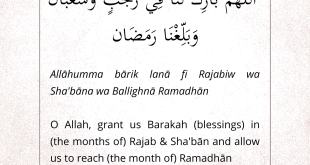 1. Refrain from anything that is doubtful or haraam whether it is doubtful food or actions etc.
1. Refrain from anything that is doubtful or haraam whether it is doubtful food or actions etc.
2. Increase four actions in Ramadhaan:
(a) The recitation of the kalimah ‘laa ilaaha illallah’
(b) istighfaar
(c) seeking entrance into Jannah
(d) seeking protection from Jahannum
عن سلمان رضي الله عنه قال خطبنا رسول الله صلى الله عليه و سلم في آخر يوم من شعبان… واستكثروا فيه من أربع خصال خصلتين ترضون بهما ربكم وخصلتين لا غناء بكم عنهما فأما الخصلتان اللتان ترضون بهما ربكم فشهادة أن لا إله إلا الله وتستغفرونه وأما الخصلتان اللتان لا غناء بكم عنهما فتسألون الله الجنة وتعوذون به من النار (الترغيب و الترهيب رقم 1483)
Hazrat Salmaan (radhiyallahu anhu) reports that Rasulullah (sallallahu alaihi wasallam) delivered a khutbah on the last day of Sha’baan (wherein he mentioned): “And (in this month) carry out four actions in abundance. Two actions are to please your Rabb and two actions are such that you cannot do without it. The two actions which will be pleasing to your Rabb is the recitation of the kalimah “Laa ilaaha illallah” and seeking His forgiveness. The two actions that you cannot do without is asking Allah Ta’ala for entry into Jannah, and seeking deliverance from the fire of Jahannum.”
3. Make abundant duaa during Ramadhaan. The duaa of a fasting person is readily accepted, especially the duaa that is made before iftaar.
عن أبي هريرة قال : قال رسول الله صلى الله عليه و سلم ثلاثة لا ترد دعوتهم الصائم حتى يفطر والإمام العادل ودعوة المظلوم يرفعها الله فوق الغمام ويفتح لها أبواب السماء ويقول الرب وعزتي لأنصرنك ولو بعد حين (ترمذي رقم 3598)
Hazrat Abu Hurayrah (radhiyallahu anhu) reports that Rasulullah (sallallahu alaihi wasallam) said: “There are three people whose Duaas are not rejected; the fasting person until he breaks his fast, the just ruler, and the duaa of the oppressed which Allah Ta’ala lifts above the clouds and opens the doors of the heavens for it. Allah Ta’ala says ‘I take a qasm on My honour, I will definitely assist you, even though it may be after some time.’”
عن عمرو بن شعيب، عن أبيه، عن جده، قال: سمعت رسول الله صلى الله عليه وسلم يقول: للصائم عند إفطاره دعوة مستجابة “. وكان عبد الله بن عمرو إذا أفطر دعا أهله وولده ودعا (شعب الايمان رقم 3624)
Hazrat Abdullah bin Amr (radhiyallahu anhu) reports that Rasulullah (sallallahu alaihi wasallam) said: “At the time of iftaar, the fasting person’s duaas are accepted.” Hazrat Abdullah bin Amr (radhiallahu anhu) would call his family and children at the time of iftaar and engage in duaa.
4. The month of Ramadhaan is known as the month of the Qur’aan. Hence, one should recite as much Qur’aan as possible. Huffaaz should recite much more than the non-huffaaz.
5. Fasting is a great ibaadat, hence during the fast one should ensure that one does not involve oneself in any action whereby the reward of the fast is lost. One should exercise caution in refraining from all types of ‘la ya’ni’ (vain talk and futile activities etc.).
عن أبي هريرة رضي الله عنه قال قال رسول الله صلى الله عليه و سلم رب صائم ليس له من صيامه إلا الجوع ورب قائم ليس له من قيامه إلا السهر (ابن ماجة رقم 1690)
Hazrat Abu Hurayrah (radhiyallahu anhu) reports that Rasulullah (sallallahu alaihi wasallam) said: “Many are the ones who fast, attaining nothing by such fasting except for hunger, and many are the ones performing salaah by night attaining nothing by it, except for the discomfort of staying awake at night.”
عن أبي هريرة رضي الله عنه قال : قال رسول الله صلى الله عليه وسلم : من لم يدع قول الزور والعمل به فليس لله حاجة في أن يدع طعامه وشرابه. (البخاري رقم 1903)
Hazrat Abu Hurayrah (radhiyallahu anhu) reports that Rasulullah (sallallahu alaihi wasallam) said: “Whoever does not restrain from shameless talk and shameless deeds (while fasting), Allah Ta’ala does not need him to refrain from eating and drinking.”
6. During the fast one should refrain from quarrelling, fighting and entering into arguments. If someone wishes to engage the fasting person into an argument, he should respectfully say to him: ‘I am a fasting person’ (i.e. it does not behove a fasting person to enter into quarrels, fights and arguments).
عن أبي هريرة رضي الله عنه قال : قال رسول الله صلى الله عليه وسلم : وإذا كان يوم صوم أحدكم فلا يرفث ولا يصخب فإن سابه أحد أو قاتله فليقل إني امرؤ صائم (بخاري رقم 1904)
Hazrat Abu Hurayrah (radhiyallahu anhu) reports that Rasulullah (sallallahu alaihi wasallam) said: “During the fast, one should not engage in obscene talk or act in an ignorant manner by shouting and yelling. If anyone hurls abuse at you or swears you, or fights with you, then you should (respectfully) say, ‘I am fasting’.”
7. Ramadhaan grants one a good opportunity to perform tahajjud as one is awake at the time of sehri.
8. Try to complete all commitments and necessary duties before Ramadhaan so that all one’s time can be dedicated and devoted to ibaadat.
عن عبادة بن الصامت رضي الله عنه أن رسول الله صلى الله عليه و سلم قال يوما وحضر رمضان أتاكم رمضان شهر بركة يغشاكم الله فيه فينزل الرحمة ويحط الخطايا ويستجيب فيه الدعاء ينظر الله تعالى إلى تنافسكم فيه ويباهي بكم ملائكته فأروا الله من أنفسكم خيرا فإن الشقي من حرم فيه رحمة الله عز و جل رواه الطبراني ورواته ثقات إلا أن محمد بن قيس لا يحضرني فيه جرح ولا تعديل (الترغيب و الترهيب رقم 1490)
Hazrat ‘Ubaadah bin Saamit (radhiyallahu anhu) reports that on one occasion close to Ramadhaan, Rasulullah (sallallahu alaihi wasallam) addressed the Sahaabah saying: “Ramadhaan, the month full of blessings is about to dawn upon you. It is in this month wherein Allah Ta’ala turns His special mercies towards you, forgives your sins, accepts your duaas and supplications, looks at your vying with each other in carrying out good deeds (to please Allah Ta’ala) and boasts to His angels about you. Hence, show Allah Ta’ala your works of piety and righteousness. For certainly the most unfortunate one is the one who is deprived of the mercy of Allah Ta’ala in this blessed month.”
 Wifāq ul Ulāma (SA) ASSOCIATION OF SOUTH AFRICAN 'ULAMA
Wifāq ul Ulāma (SA) ASSOCIATION OF SOUTH AFRICAN 'ULAMA
